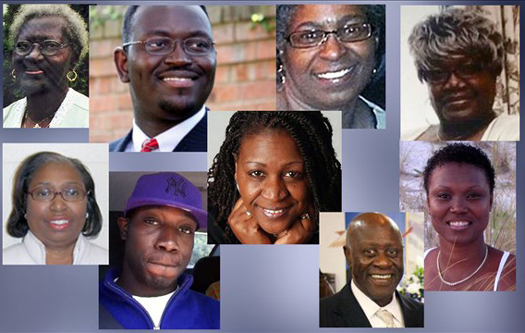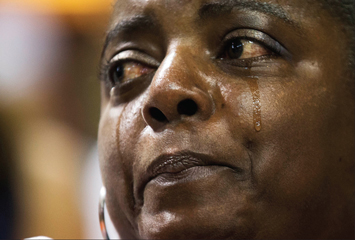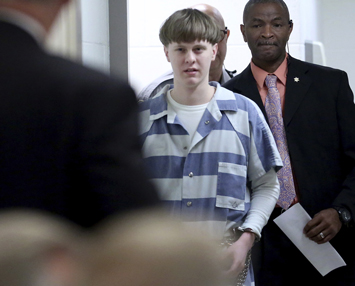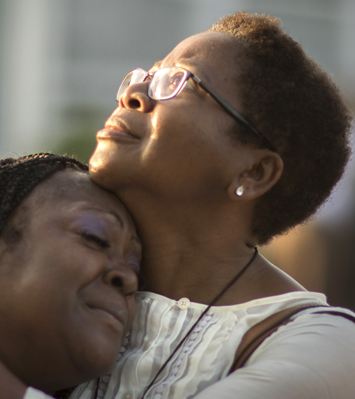As Charleston marks a painful anniversary, many see too little progress, lament lost opportunity that followed a major tragedy
By Brian E. Muhammad -Contributing Writer- | Last updated: Jun 19, 2019 - 8:29:20 AMWhat's your opinion on this article?

A collage of the nine victims of the Emanuel AME Church shooting.
|
COLUMBIA, S.C.—The emotional commemoration of June 17, 2015 marked a date etched in the memory of America because of the racially-motivated murder of nine Black parishioners during a Bible Study inside Mother Emanuel African Methodist Episcopalian Church in Charleston.
Several events and forums brought together leaders and opinion makers to discuss the state of affairs in Charleston and around the country four years after the tragedy.

In this, June 19, 2015 fi le photo, Barbara Lloyd, of Charleston, S.C., cries during the singing of "We Shall Overcome" at a memorial service for nine victims of the shooting by Dylann Roof at Emanuel AME Church, in Charleston, S.C. Photo: AP Photo/David Goldman, File
|
The brutal killings sent shockwaves nationally and sparked indignation against the racial violence worldwide. But a question looms: Have things gotten better or worse since the murder spree that bloody Wednesday night?
“That is a day that will live in infamy,” said Johnnie Cordero, chairman of the Democratic Black Caucus of South Carolina. “You ask the question what has changed; and frankly I don’t know that anything has changed.”
“Without fear of contradiction,” this violence is all coming from a growing White supremacist movement, declared Mr. Cordero. “These are homegrown terrorists who are targeting our people … not outside people from outside the United States. These are people inside of the United States.”
The U.S. has yet to enact “true hate” crime ordinances that will counteract White domestic terror, he observed. There are hate crime laws, but “domestic terror” as a specific charge doesn’t exist under federal legal guidelines.
After the shooting, State Representative Wendell Gilliard, who serves the Charleston community where Mother Emanuel is located, introduced hate crimes bill H3063, which state lawmakers have yet to pass. South Carolina along with Georgia, Wyoming and Arkansas are the only states without an official hate crimes law.
“I challenge the mayor … the governor, everybody at the sign of my voice—get on board,” said Mr. Gilliard, addressing a June 16 race forum at the Charleston Music Hall, in commemoration of the “Emanuel 9,” Black church goers who lost their lives in the mass shooting.

In this April 10, 2017, file photo, Dylann Roof enters the court room at the Charleston County Judicial Center to enter his guilty plea on murder charges in Charleston, S.C. Photo: Grace Beahm/The Post And Courier via AP, Pool, File
|
During a mid-May congressional hearing on responding to White supremacy, Trump administration officials admitted the government is not proficient in dealing with the issue. Elizabeth Neumann of the Department of Homeland Security acknowledged not doing enough to prevent domestic terror. Still, she insisted, the Trump administration is doing more than has been previously done. “We know we’re not doing enough. Part of the reason we haven’t done enough is because things have not—it’s bureaucratic, it’s boring—things have not been institutionalized,” said Ms. Neumann, the department’s assistant secretary for threat prevention and security policy. The department is working to figure out how to do that “so that the budget process can work, and we can get proper funding for prevention efforts moving forward.”
However, two years after Dylann Roof—now on death row—was sentenced to die for the killings at Mother Emanuel, observers said things are getting progressively worse in America.
“We are unfortunately in a moment of great and grave racial crisis,” said Dr. Bernard Powers, professor emeritus of history at the College of Charleston.
Certain things are obvious and other things are not as obvious, he told The Final Call in a telephone interview. “What’s obvious is the sentiments that led to the murders over there at Emanuel, they still exist, and we have seen them displayed repeatedly in different venues,” Dr. Powers said.
“We have seen it displayed against Muslims … against Jews, anyone considered to be ‘the other’ has become the object of hostility,” said Dr. Powers.

Gillettie Bennett, right, comforts Clarissa Jackson, left, June 21, 2015, while she waits in line for Emanuel AME Church’s fi rst worship service since nine people were fatally shot at the church during a Bible study group, in Charleston, S.C. Photo: AP Photo/Stephen B. Morton
|
According to the most recent available figures, from 2017, the U.S. Justice Department reported hate crimes are on the rise in America—mostly White domestic terrorism against Blacks and other minority groups. Hate crimes include murder, assault, vandalism, rape and robbery.
Of nearly 9,000 hate crimes reported, 58 percent were racially/ethnically motivated, 22 percent were religiously motivated, and 16 percent motivated by sexual orientation, said the Justice Department. The 2017 report showed an increase in each of the categories over 2016 numbers. Of known offenders, 51 percent were White, 21 percent were Black and 19 percent race unknown.
Just in recent months Robert Bowers, 46, a White Nazi opened fire in the Tree of Life Synagogue in Pittsburg killing 11 people and injuring others. Islamophobia watchers identified more than 500 potentially anti-Muslim incidents in the U.S. since the start of 2019 and that’s probably a low estimate, according to the Council of American Islamic Relations.
A June 16 discussion convened by the Charleston Forum at the Charleston Music Hall raised the issue of the growing problem of race hate and related issues. The forum was established in the aftermath of the church killings. Meeting for the third-year, organizers said the theme was “less talk, more action.”
Presenters were asked to give solutions they are implementing, how they will make a difference, and ways the community can participate. Following remarks from city and state politicians, including Charleston Mayor John Tecklenburg, there was a keynote conversation with Mother Emanuel Pastor Eric Manning and Rabbi Jeffrey Myers of the Tree of Life Synagogue, moderated by Today Show host Craig Melvin.
Rabbi Myers believes America will experience bloodshed again like at the church, synagogue, and mosques in Christchurch New Zealand.
“We’re not done seeing massacres in the United States,” Rabbi Myers said.
Along with the violence, there has also been an uptick in White nationalism that observers said took on steam with the election of Donald Trump. They say in the 2020 presidential election season, the problem of White supremacy in America cannot be absent from political discussions.
“This administration has emboldened White nationalism, White supremacy and far-right extremism including anti-Semitism and Islamophobia, all while suggesting these groups do not present a growing threat to our communities and national security,” argued Rep. Ayanna Pressley (D-Mass.) in the mid-May congressional hearing on Civil Rights and Civil Liberties titled “Confronting White Supremacy: The Consequences of Inaction.”
“Although there is no hierarchy of hurt, throughout our nation’s history, hate crimes have disproportionately impacted the Black community,” she said.
Since 1995, Blacks were 66 percent of all victims in racially motivated hate crimes, Rep. Pressley pointed out. “The numbers don’t lie. Black Americans continue to find themselves at the greatest risk.”
“Mother Emanuel is kind of what they used to call ‘the canary in the mine’… a harbinger, an indication of what exists and what is likely to continue to exist for some undefined time going forward,” said Dr. Powers.
Charleston was a bastion for White supremacy and a main port in the trans-Atlantic slave trade where an estimated 40 percent of Africans brought on slave ships were offloaded as commodity for auction. Leading up to the church massacre, the city had a long, sordid record of slavery and racially biased terrorism.
When the killing at the church happened, the White establishment along with some Black leaders moved to contain potential anger in the streets and control the narrative before the world, said some activists.
“The bad part about it was that Charleston put on a show,” said activist Shakem Akhet. “The White folks and the negro establishment put on a show to the world that was false.” Prior to the “false” narrative of a city coming together in tragedy, race relations in the city were poor as well as in South Carolina, a “White conservative Republican, Trump-supporting state,” he said.
“Dylann Roof personified the attitudes, sentiment, ideology … everything the local White establishment represented,” said Mr. Akhet.
Mr. Gilliard reasoned, “America is the greatest country in the world,” but some try to hide the magnitude of problems in Charleston.
“When you come to my state and my city … you will have people show you the state and the city … they want you to see and that’s the rich and the elites,” he argued.
“Then you’ll have the middle class and the poor—the grassroots people wanting to show you the state and the city you need to see,” he said.
In the wake of the church tragedy, a “kumbaya” spirit and “we forgive” permeated responses among some. Removing long flying Confederate flags from public places in South Carolina, and an official apology for Charleston’s role in the slave trade took place. Some say these were positives in the painful aftermath of the killings.
For others, the apology and admission Charleston’s economic prosperity come from the blood and sweat of slaves in the colonial and antebellum era was contradicted by current discrimination. The fruits of slave labor denied to the slave parallels continued denial of Blacks in Charleston, they said.
Speaking to the Final Call, Mr. Gilliard said after the tragedy, Charleston went back to business as usual. “Like we’ve done before in so many times in history when we had tragedies, as time goes on everybody will show up at funerals … make commitments that’s coming not from the heart nor the soul,” said Mr. Gilliard. “They’ll show up for the moment to be seen, to be heard.”
While the national spotlight has dimmed on the Emanuel 9 killing, there are a myriad of problems ill effecting Blacks in Charleston, including downtown gentrification pushing Black residents out; a deteriorated educational system and gun violence.
“You can only have social progress when you empower people from an economic standpoint,” said Mr. Gilliard. “One cannot do without the other.”
The five-term lawmaker said Blacks are in the same relative position four years after world attention was on Charleston over the massacre.
“You look at all the hatred as pertains to the prejudice, racism that is still going on even after these tragedies, we’re not moving the needle,” Mr. Gilliard said.
“It’s really sad that it happened, but it’s also sad that it could have been a lot better for the people of Charleston and the church had the lead on it and they dropped the ball,” said James Johnson of the National Action Network. As a community leader Mr. Johnson was active in the immediate aftermath of the killing. He was one of the voices discouraging violent reaction in the streets by those angry about the blatant shedding of Black blood.
“Nothing has gotten better, only better for a few people,” Mr. Johnson lamented. He sees it as a “missed opportunity,” for collective change in Charleston.
News of the tragedy went global and garnered worldwide sympathy for the people of Charleston. Mr. Johnson places some of the blame on African Methodist Episcopalians, which are influential in the Black community.
“People thought about their personal gain,” he said. “We still suffering.”
The criticism takes nothing away from the respect for the families of the victims, who have endured an unspeakable painful experience, stressed Mr. Johnson. “It’s just that substantive change in the city never happened at the delight of the White-controlled power structure wrought with continuous discrimination, injustice and inequality. They don’t want to talk about what they are doing to Black people.”
“At some point we have to look at the heart of the problem. I believe that legislation can be put in place that will solve some of this,” added Mr. Cordero. “But unfortunately, the thing that seems to be standing in the place is spineless politicians who know what’s right, but just will not do it.”
INSIDE STORIES AND REVIEWS
-
-
About Harriett ... and the Negro Hollywood Road Show
By Rabiah Muhammad, Guest Columnist » Full Story -
Skepticism greets Jay-Z, NFL talk of inspiring change
By Bryan 18X Crawford and Richard B. Muhammad The Final Call Newspaper @TheFinalCall » Full Story -
The painful problem of Black girls and suicide
By Charlene Muhammad -National Correspondent- » Full Story -
Exploitation of Innocence - Report: Perceptions, policies hurting Black girls
By Charlene Muhammad -National Correspondent- » Full Story -
Big Ballin: Big ideas fuel a father’s Big Baller Brand and brash business sense
By Bryan Crawford -Contributing Writer- » Full Story






 Click Here Stay Connected!
Click Here Stay Connected!








